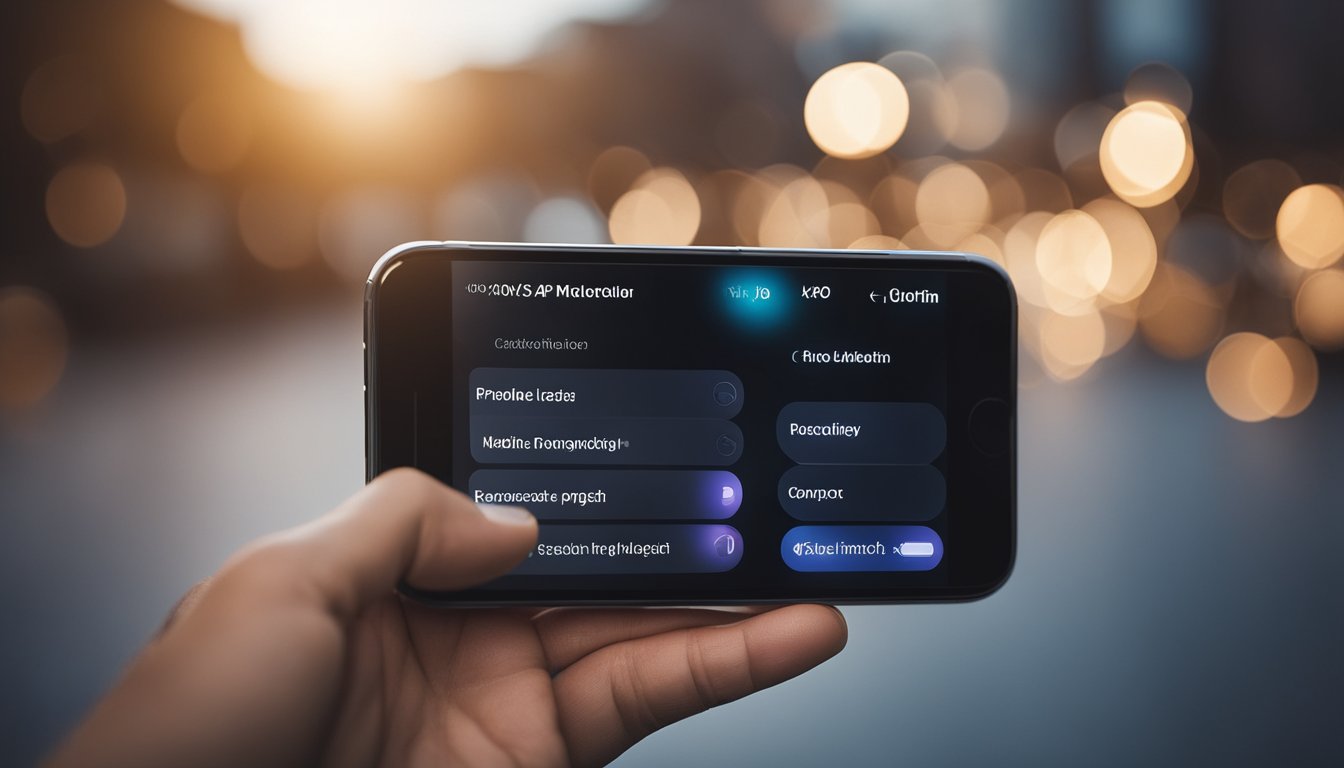
Optimizing Mobile Apps for Voice Search and Recognition Best Practices
As the world becomes more mobile-focused, voice search and recognition is quickly becoming a popular option for users to interact with their devices. With the rise of virtual assistants like Siri, Alexa, and Google Assistant, users are expecting more
As the world becomes more mobile-focused, voice search and recognition is quickly becoming a popular option for users to interact with their devices. With the rise of virtual assistants like Siri, Alexa, and Google Assistant, users are expecting more from their mobile apps. Creating a mobile app that is optimized for voice search and recognition can help you stay ahead of the competition and provide a better user experience.

Understanding Voice Search and Recognition is the first step in creating a voice-optimized mobile app. Voice search allows users to search for information on their mobile devices using their voice, while voice recognition refers to the ability of the device to recognize and interpret spoken language. By understanding how voice search and recognition work, you can design your mobile app to take advantage of these features and provide a seamless user experience.
Creating a Voice Optimized Mobile App requires a different approach than traditional app development. You need to focus on creating a user interface that is easy to navigate using voice commands and ensure that the app is optimized for the unique challenges of voice recognition. By keeping these factors in mind, you can create an app that is not only easy to use but also optimized for voice search and recognition.
Key Takeaways
- Optimizing your mobile app for voice search and recognition can improve the user experience and keep you ahead of the competition.
- Understanding how voice search and recognition work is crucial to creating a voice-optimized mobile app.
- Creating a voice-optimized mobile app requires a different approach than traditional app development, with a focus on creating an easy-to-navigate user interface and optimizing for the unique challenges of voice recognition.
Understanding Voice Search and Recognition

As technology advances, voice search and recognition have become increasingly important for mobile app developers to consider. Voice search is the ability to search for information on the internet using spoken words instead of typing. Speech recognition, on the other hand, is the ability of a computer to recognize and interpret spoken words.
Natural language processing (NLP) is a key component of voice search and recognition. It allows the computer to understand the meaning of the spoken words and interpret them correctly. This is important because people often speak in a conversational tone, using slang and idioms that may not be easily understood by a computer.
Voice assistants, such as Siri and Alexa, use speech-to-text technology to convert spoken words into text. This text is then analyzed by the voice recognition software to determine the user's intent. The software then provides a response to the user's query.
There are two main types of voice recognition: speaker-dependent and speaker-independent. Speaker-dependent voice recognition requires the user to train the system to recognize their voice. Speaker-independent voice recognition, on the other hand, can recognize any speaker without prior training.
Google Voice Search is an example of an automatic speech recognition system (ASR) that uses machine learning and artificial intelligence to improve its accuracy over time. It is able to recognize a wide range of accents and dialects, making it a popular choice for voice search.
Conversational search is a newer development in voice search and recognition. It allows users to ask follow-up questions and have a more natural conversation with the computer. This is achieved through NLP and machine learning algorithms that allow the computer to understand the context of the conversation.
In conclusion, understanding voice search and recognition is essential for mobile app developers who want to create apps that are optimized for this technology. By incorporating NLP, machine learning, and artificial intelligence, developers can create apps that provide a more natural and intuitive user experience.
Creating a Voice Optimized Mobile App

As more and more people use voice search on their mobile devices, it is essential to create a mobile app that is optimized for voice recognition. Here are some tips for creating a voice-optimized mobile app:
-
Use libraries and software that support voice recognition: There are many libraries and software available that support voice recognition, such as JavaScript, Python, and APIs like the Google Speech API and Bing Speech API. These libraries and software can help you easily integrate voice recognition into your mobile app.
-
Utilize AI capabilities: Digital assistants like Siri, Alexa, and Google Assistant all utilize AI capabilities to improve their voice recognition and response abilities. By utilizing AI capabilities in your mobile app, you can improve its voice recognition and response abilities as well.
-
Focus on navigation and search functionality: Mobile users often use voice search to find information quickly and easily. Therefore, it is essential to focus on navigation and search functionality in your mobile app. Make sure that your mobile app is easy to navigate and that users can easily find what they are looking for.
-
Consider speech synthesis and text-to-speech: In addition to voice recognition, speech synthesis and text-to-speech can also be useful tools for creating a voice-optimized mobile app. These tools can help your mobile app provide more personalized and engaging experiences for users.
-
Choose the right deployment model: There are two primary deployment models for voice-optimized mobile apps: speaker-independent and speaker-dependent. Speaker-independent apps can recognize any voice, while speaker-dependent apps require users to train the app to recognize their voice. Consider which deployment model is best for your mobile app based on its intended use and target audience.
-
Prioritize customer experience: Creating a voice-optimized mobile app is all about improving the customer experience. Therefore, it is essential to prioritize customer experience when designing and developing your mobile app. Consider how your mobile app can help users accomplish their goals quickly and easily, and make sure that it provides a seamless and enjoyable experience.
Overall, creating a voice-optimized mobile app requires careful consideration of the various entities involved, including libraries and software, AI capabilities, navigation and search functionality, speech synthesis and text-to-speech, deployment models, and customer experience. By focusing on these key areas, you can create a mobile app that is optimized for voice recognition and provides a seamless and enjoyable experience for users.
Challenges and Solutions in Voice Recognition

As voice recognition technology becomes more prevalent in mobile apps, it is important to address the challenges that come with it. Here are some of the most common challenges and solutions in voice recognition:
Accents and Volume
One of the biggest challenges in voice recognition is dealing with different accents and volumes. Accents can cause errors in recognition, while volume can affect the accuracy of the transcription. To address this, developers can use machine learning algorithms to train the app to recognize different accents and adjust for volume.
Background Noise
Background noise can also be a challenge in voice recognition. To minimize background noise, developers can use noise-cancellation algorithms or require users to speak into the microphone in a quiet environment.
Errors in Recognition
Errors in recognition are another challenge in voice recognition. To improve accuracy, developers can use linear predictive coding (LPC), which analyzes speech patterns to predict the next sound. Additionally, developers can use pitch and schema to create a more personalized experience for the user.
Privacy and Security
Privacy and security are also important considerations in voice recognition. Developers should use SSL and other security measures to protect user data, and should also provide clear information about how user data is collected and used.
Fulfillment
Fulfillment is another challenge in voice recognition, as users may have different expectations for what the app can do. To address this, developers can use algolia or other search engines to provide relevant results, and can also use speechsynthesis to provide a more natural and personalized experience.
Optimization for Voice Search
Finally, developers should optimize their app for voice search by using HTML, CSS, and other web server technologies. Additionally, developers should ensure that their app is compatible with popular smart speakers like Amazon Alexa, and should also focus on backlinko and other SEO strategies to improve visibility in search results.
Overall, voice recognition presents both challenges and opportunities for mobile app developers. By understanding these challenges and using the right tools and strategies, developers can create apps that provide a more natural and personalized experience for users.
Voice Search Optimization for Mobile Apps

As voice search continues to evolve, it has become increasingly important to optimize mobile apps for voice recognition systems. Voice search optimization for mobile apps involves upgrading and streamlining the information on your app to appear in voice searches. This process aims to optimize your app to answer the questions for people when they conduct verbal searches.
To optimize your mobile app for voice search, you need to understand how search engines and voice recognition systems work. Traditional search engines rely on text-based queries to return relevant results. However, voice recognition systems use natural language understanding to interpret spoken queries and provide the most accurate results.
To increase your app's visibility in voice search results, you need to implement search engine optimization (SEO) strategies. This includes using long-tail keywords, optimizing your app's content for featured snippets, and ensuring that your app is secured with HTTPS.
One of the most effective ways to optimize your mobile app for voice search is to provide concise and accurate answers to common questions. This involves identifying the most frequently asked questions related to your app and providing clear and concise answers. By doing so, your app is more likely to appear in voice search results when people ask these questions.
In conclusion, optimizing your mobile app for voice search is crucial for improving its visibility and increasing user engagement. By understanding how search engines and voice recognition systems work, implementing effective SEO strategies, and providing concise and accurate answers to common questions, you can ensure that your app is optimized for voice search and recognition.
Frequently Asked Questions

What are some best practices for optimizing mobile apps for voice search and recognition?
To optimize mobile apps for voice search and recognition, there are several best practices to follow. Firstly, it's essential to ensure that the app's content is conversational and easy to understand. Secondly, the app should be designed to be mobile-friendly and responsive. Additionally, it's important to use long-tail keywords in the app's content to improve its visibility in search results.
How can AI be utilized to improve voice search optimization in mobile apps?
Artificial intelligence (AI) can be used to improve voice search optimization in mobile apps in several ways. For example, AI-powered chatbots can help users find the information they need quickly and easily. Additionally, AI can be used to analyze user behavior and preferences, allowing developers to tailor their mobile apps to better meet user needs.
What are some key considerations for conducting voice search keyword research for mobile app development?
When conducting voice search keyword research for mobile app development, it's important to consider factors such as user intent, language patterns, and search volume. Developers should also take into account the specific needs and preferences of their target audience when selecting keywords for their mobile apps.
What are some effective ways to optimize content for voice search in mobile apps?
To optimize content for voice search in mobile apps, developers should focus on creating conversational and easy-to-understand content. Additionally, using natural language and long-tail keywords can help improve the visibility of the app in search results. It's also important to ensure that the app's content is optimized for mobile devices and responsive to different screen sizes.
What are some popular programming languages and technologies used for developing mobile apps with voice recognition capabilities?
Some popular programming languages and technologies used for developing mobile apps with voice recognition capabilities include Swift, Kotlin, and Java. Additionally, frameworks such as React Native and Ionic can be used to build cross-platform mobile apps with voice recognition capabilities.
What are some key differences between optimizing mobile apps for voice search versus traditional text-based search?
Optimizing mobile apps for voice search requires developers to focus on creating conversational and easy-to-understand content, as well as using natural language and long-tail keywords. Additionally, mobile apps optimized for voice search should be designed to be mobile-friendly and responsive. In contrast, traditional text-based search optimization focuses on using short-tail keywords and optimizing content for search engine algorithms.




